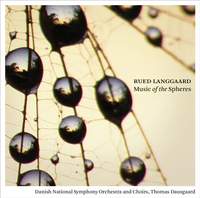Recording of the Week,
Rued Langgaard - Music of the Spheres
Last Wednesday’s BBC Prom saw the UK premiere of Danish composer Rued Langgaard’s Music of the Spheres. It is a work I only heard for the first time a few weeks before, when Thomas Dausgaard and the Danish National Symphony Orchestra released a CD of it as part of their ongoing Langgaard cycle on Dacapo. It is a tremendous and fascinating work - probably his most important and certainly his most original, and is scored for huge forces - requiring soprano soloist, a big orchestra (including eight horns), organ and piano, four sets of timpani, a choir and another 15-strong 'orchestra in the distance'.

Rued Langgaard (1893-1952) was for a long time a lonely and almost forgotten figure in Danish music as, after a promising start (his First Symphony was premiered by the Berlin Philharmonic when he was just 19 and he was hailed as the natural successor to the great Danish symphonist Carl Nielsen), the experimental and non-conventional nature of his compositions meant that he soon fell out of favour. He struggled for recognition throughout his lifetime and died in 1952 virtually unknown.
There he remained until 1968 when György Ligeti (who was adjudicating new scores by Scandinavian composers) began reading Music of the Spheres, which had been secretly included by composer Per Nørgård in amongst scores of contemporary Danish works. Ligeti was astonished that many of the techniques he had been employing in his own music had in fact been foreshadowed by Langgaard a half century earlier and quipped that he had merely been a “Langgaard imitator” all along.
Since then Langgaard's reputation has been gradually building and most of his more important works have now been recorded, including all 16 symphonies and his opera Antikrist. This new disc from Dacapo serves as an excellent introduction to Langgaard as, in addition to the groundbreaking Music of the Spheres (written during World War I when the composer was just 26), it also includes two much later works so you get a good overview of his style.
Together these three works are among his most effective and visionary orchestral works. They are apocalyptic works with a religious message, each depicting contrasts between a chaotic doomed world and a celestial and beautiful one. The Music of the Spheres is evocative yet often startling music, with clusters of notes and striking timbres. As mentioned earlier it is definitely Langgaard’s most original and forward-pointing work, and despite the long delay before the UK premiere is undoubtedly a major work in Scandinavian music. I’ve put a short video on the website which includes interviews with conductor Thomas Dausgaard and also gives you a little bit more of an introduction to Langgaard’s music.
Langgaard: Music of the Spheres
Inger Dam-Jensen (soprano), Hetna Regitze Bruun (mezzo-soprano), Johan Reuter (baritone) & Lars Cleveman (tenor)Danish National Symphony Orchestra & Danish National Concert Choir, Thomas Dausgaard
Available Formats: MP3, FLAC, Hi-Res FLAC



